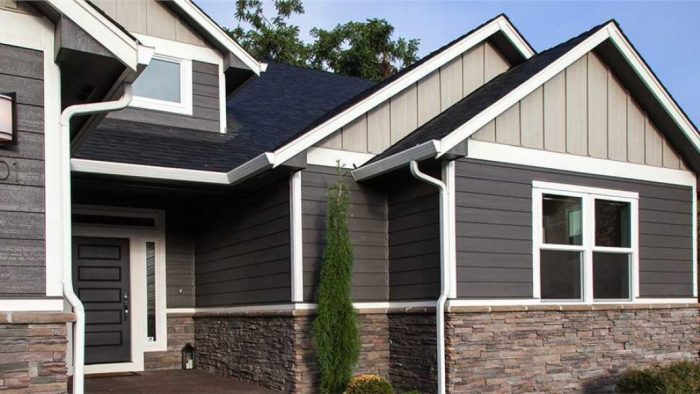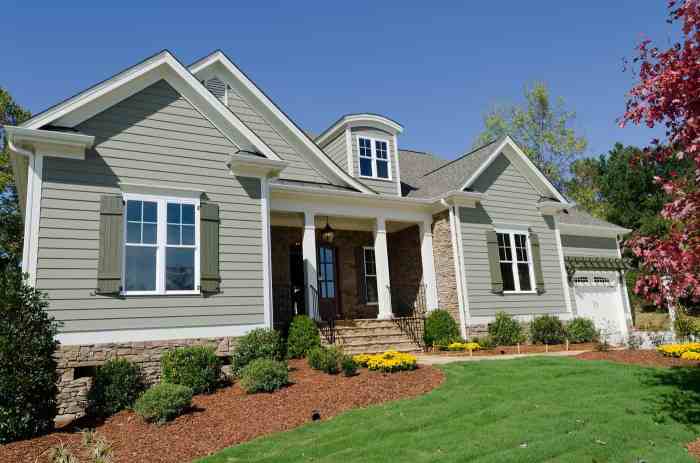Finding Reliable Siding Contractors Near Me

Embark on a journey to discover the best siding contractors near you. This guide will equip you with essential knowledge to make informed decisions and ensure a seamless siding project for your property.
Delve into the realm of siding contractors, explore different materials, and learn the key steps to hiring the right professionals for the job.
Researching Siding Contractors
When starting the search for siding contractors near you, it is important to first gather a list of potential contractors in your area. This can be done through online research, asking for recommendations from friends or family, or checking local business directories.
Key Factors to Consider
- Experience: Look for contractors with a proven track record of successfully completing siding projects.
- Licensing and Insurance: Ensure that the contractor is properly licensed and carries adequate insurance to protect you and your property.
- Quality of Materials: Inquire about the types of materials the contractor uses and ensure they are of high quality.
- Pricing: Get quotes from multiple contractors and compare them to ensure you are getting a fair price for the work.
Importance of Reading Reviews and Checking References
Reading reviews from past clients can give you insight into the contractor's reputation and the quality of their work. Additionally, checking references allows you to speak directly with previous clients and get their feedback on their experience working with the contractor.
Types of Siding Materials
When it comes to choosing siding materials for your residential property, there are several options available in the market. Each type of siding material comes with its own set of advantages and considerations that homeowners should take into account before making a decision.
Vinyl Siding
Vinyl siding is one of the most popular choices among homeowners due to its affordability and low maintenance requirements. It is durable, resistant to rot and insects, and comes in a variety of colors and styles. However, vinyl siding can crack or fade over time, and it may not provide the same level of insulation as other materials.
Fiber Cement Siding
Fiber cement siding is known for its durability and resistance to fire, insects, and rot. It can mimic the look of wood or stucco but requires less maintenance. While fiber cement siding can be more expensive upfront, it tends to have a longer lifespan and may increase the resale value of a home.
Wood Siding
Wood siding offers a natural and timeless look that many homeowners find appealing. It can be painted or stained in various colors and finishes to suit different architectural styles. However, wood siding requires regular maintenance, including staining, painting, and sealing to protect it from moisture, rot, and pests.
Aluminum Siding
Aluminum siding is lightweight, easy to install, and resistant to fire and insects. It is also low maintenance and can be painted to achieve a custom look. However, aluminum siding may dent or scratch easily, and it may not provide as much insulation as other materials.
Cost Implications
The cost of siding materials can vary significantly depending on the type of material, quality, and installation requirements. Vinyl siding is generally the most affordable option, while fiber cement and wood siding tend to be more expensive. Homeowners should consider not only the upfront cost but also the long-term maintenance and durability of the siding material when making their decision.
Hiring the Right Siding Contractor

When it comes to hiring a siding contractor, it's essential to find a reliable and reputable professional who can deliver high-quality work. Here are some tips to help you evaluate and choose the right siding contractor for your project.
Evaluating Credibility and Reputation
Before hiring a siding contractor, take the time to research their credibility and reputation. Look for online reviews, ask for references from past clients, and check if they are affiliated with any professional associations in the industry.
Checking for Licenses, Insurance, and Warranties
It is crucial to ensure that the siding contractor you hire is licensed, insured, and offers warranties for their work. A valid license demonstrates that they have met the necessary requirements to operate legally, while insurance protects you in case of accidents or damages during the project.
Warranties provide assurance that the contractor stands behind their work.
Obtaining Multiple Quotes and Conducting Interviews
To make an informed decision, it's recommended to get multiple quotes from different siding contractors. This will give you an idea of the average cost of the project and help you compare services offered by each contractor
Siding Installation Process

When it comes to the siding installation process, there are several key steps involved that ensure a successful outcome for your home. From preparation to finishing touches, each phase plays a crucial role in the overall quality and longevity of your siding.
Preparation and Inspection
Before the actual installation begins, a thorough inspection of your home's exterior is conducted to assess the condition of the existing siding and any underlying structures. This step helps identify any repairs or modifications needed before the new siding can be installed.
- Inspecting the current siding for damage or wear.
- Checking the structural integrity of the walls.
- Measuring and preparing the area for new siding installation.
Siding Installation
Once the preparation is complete, the actual installation of the siding can begin. This phase involves carefully placing and securing the siding material according to the manufacturer's guidelines and industry best practices.
- Ensuring proper alignment and level placement of each siding panel.
- Securing the siding with nails or screws at the designated points.
- Applying any necessary trim pieces or accessories for a seamless finish.
Weather Considerations
Weather conditions can significantly impact the timeline and success of siding installation. Extreme temperatures, high winds, or precipitation can delay the process and affect the quality of the installation.
- Planning the installation during favorable weather conditions to minimize delays.
- Taking precautions to protect the siding materials from exposure to harsh weather elements.
- Adjusting the installation schedule as needed to accommodate changing weather patterns.
Common Challenges and Solutions
During siding installation, several common challenges may arise that require quick and effective solutions to ensure the project stays on track and meets quality standards.
- Uneven walls or surfaces: Addressed by adjusting the installation technique or using additional materials to create a smooth finish.
- Misaligned panels: Corrected by carefully realigning the panels and ensuring proper securement.
- Moisture issues: Mitigated by installing proper insulation and moisture barriers to protect the home from water damage.
Final Summary
In conclusion, navigating the world of siding contractors near you can be daunting, but armed with the right information, you can confidently tackle your siding project. Make the most of your investment by choosing wisely and overseeing the process with care.
Frequently Asked Questions
How can I start my search for siding contractors near me?
Begin by asking for recommendations from friends or neighbors, searching online directories, and checking local business listings.
What factors should I consider when researching siding contractors?
Consider their experience, reputation, licensing, insurance, warranty offerings, and past customer reviews.
Why is it important to obtain multiple quotes before selecting a siding contractor?
Getting multiple quotes allows you to compare costs, services, and professionalism to make an informed decision.
How do weather conditions affect the siding installation process?
Extreme weather can delay the installation and impact the quality of work, so it's crucial to plan accordingly.

